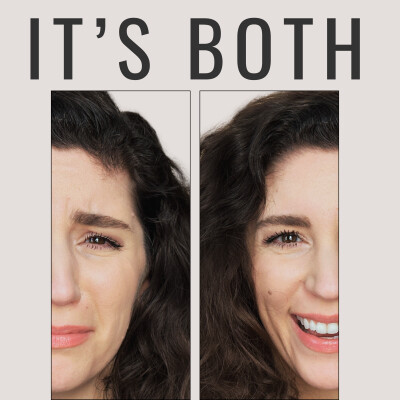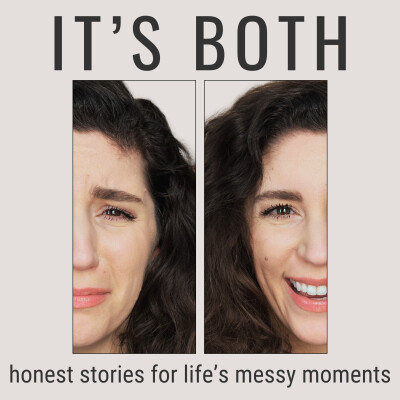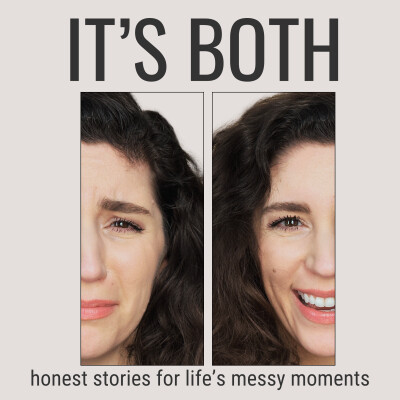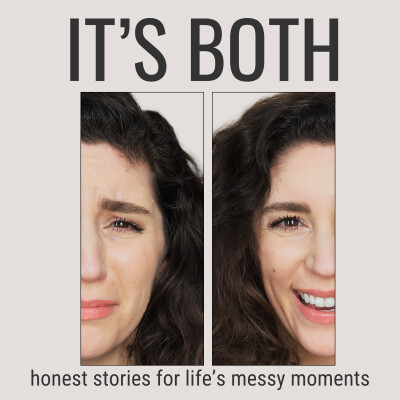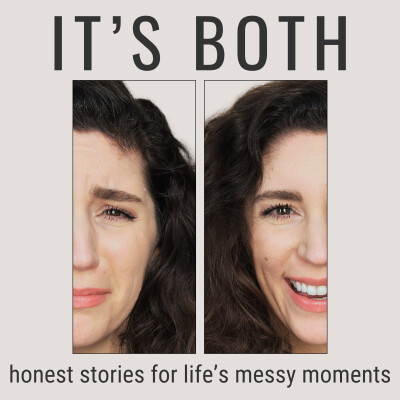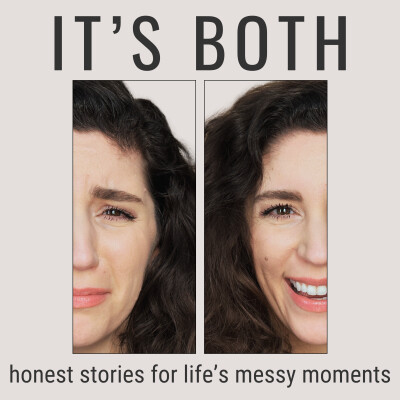Speaker #0Hello and welcome to It's Both. I am your host Nikki P and I'm so excited to have you here today. Today it is just me. We are doing a solo episode because there are some things that I want to process and I want to talk through because honestly a lot of these things are typically things that I wouldn't talk much about. I would kind of go into myself, so to speak. I would go retreat inward and process and think about and ruminate on a lot of these things alone in isolation. And part of what I am trying to create with this space and this podcast is that space where we feel comfortable and safe And we... want to share about the things that we are struggling with or the things that have been positive. I mean, whatever it might be, I want this to be a space where we feel like we can talk about the really hard things, the things that aren't really clear, the things that aren't black and white. And so with that spirit, I am trying to practice that myself and wanting to talk a little bit about just kind of what I've been dealing with in the struggle. really over the last year or so, but it's come to a head more in the last few months. But I'm trying to think of the right word because I want to say grief. And I think that's the right word. Sometimes I feel like it's not fair or it's not okay for me to use a word like grief when it's not a massive loss of a loved one. I feel like it's almost insulting for me to use the word grief when it's a situation other than that. because I can't imagine and knowing so many people who have lost loved ones and people very close to them, like the true grief that you experience in that sense. And yet I've been pushed lately through a few different people as well as my therapist to acknowledge that even though I'm not going through that very specific experience, I am experiencing a lot of grief in a lot of different areas of my life right now. And to give some context, I... So my full-time job, I work at a nonprofit. I'm in nonprofit leadership. And my background is I'm a licensed therapist. And so over the last, gosh, seven years, I've been at this nonprofit and worked with one of the initiatives of this nonprofit that's been my full-time job, working with this initiative. And the point of that work was to help prevent and end family homelessness. That was what we were doing. And it's changed so much over the years, but we received grants from campaigns or other, you know, other funding sources. And then we would distribute those dollars to, I think, you know, there was maybe 30 plus partners at one point throughout middle Tennessee. And we would distribute those dollars to those partners and they would be the ones like on the ground, helping families who were either homeless or at risk of homelessness, which Really what that means is anybody who's struggling to pay rent, utilities, struggling just by that month to month, we can't get by. And they have a family. In Nashville alone, just through reports from the school system, there were over 4,000 students who did not have safe and stable homes. So that means they were either actually homeless, living on the street, living in a place not meant for habitation, or they were doubled up. which means living with friends or family members, living in a hotel or motel, things like that. And a lot of times you don't realize how many families are in that situation because much of that is unseen. It is the situation where a family is staying with somebody they love, a friend or a family member, or maybe they're in a hotel or a motel. The amount of instability that that creates for the family is huge. And I want to give all this context because I think it really matters. I became very invested in this work for many reasons. Um, but with my job, what we did at our nonprofit was convene all those 30 partners, make sure there was professional development. There was training, create referral pathways across Nashville to ensure that all the different nonprofits working with families in this space that were a part of our work. We're talking to each other. We're collaborating. We're working together around a family. So what I mean by that is, you know, you might have one agency that really does. case management or coaching with a family, which is wonderful. And then you have another agency. And their primary job is to do workforce development. So, you know, helping work on job skills, find career pathways, go back to school. Then you might have a therapist who's working with families on, you know, coping, stress, anxiety, trauma. And there are all these different providers that have different specialties. But what usually happens in the space and nonprofits is none of these agencies talk to each other. So you've got a family, right, who's in crisis, and they're going to six different agencies for six different. things. And so a lot of the work that me and my team were doing was to help support the collaboration amongst all those different partners to ensure that we're actually like coming around a family, surrounding a family to provide them with the best care where we were working on the back end to make sure we were talking so that the client didn't have to go to all these different places and fill out new paperwork and fill out new things and tell their story over and over and over. It's a lot of backstory, but that was what... I've been doing for the last seven years. The work itself, the initiative itself, this was the 10-year kind of anniversary of the work. And at this point, we were, as of last year, there were 140 staff members that we were funding through this work. We oversaw, we did the reporting, we worked with the state when we received these dollars to do all the backend stuff so the partners didn't have to. And it was a very large grant. And so it was millions of dollars a year to support. 140 jobs. It also supported about 30 different agencies. We were serving about 900, I want to say 900 families a year, 900 families a year, which is huge. It's just amazing to be able to reach that many people who are in need of help. And I loved it. I love my job and I had a team and I was working with, you know, it varied throughout the years, but anywhere from two to three team members all the way up to eight. And I got to do the things that I love to do, which was focus on building relationships, like creating culture, not only within our team, but within the partners. I loved my team. I loved our partners. I loved getting to see our partners. I loved getting to meet with them, to talk to them, to help them, you know, think through barriers that they were seeing, to get their feedback, to do training with them. And there's so much that just was life-giving for me. I knew that it was impactful, not only for staff, but for clients. And so it made the work. I was like, I'm not, I don't ever want to leave this job. Like, I love it. It's doing good. I enjoy it. I love the people, everything about it. Like, of course, there's always things we can improve. And that was something that I really always wanted to do is like, hey, let me know what's not working so we can fix it. And then last year, we were coming to the end of our grant cycle. And again, we had been funded for 10 years now and did not anticipate not being funded. We thought we wouldn't get as much money and we prepared for that because of everything happening with our political climate. But what I didn't anticipate was getting no funding. We have multiple different funding streams, but the primary source of funding was a large grant and they didn't fund us at all. And I mean, I tell you, it was a big shock because millions of dollars a year, it's... it's hard to come by for a nonprofit. And so it was really hard for me because we had to, one, sit in a space for almost a year where everyone's looking to me and to my boss for guidance, for answers. And we had no idea because it wasn't up to us. We were getting no feedback from the people that were funding us, no indication of a timeline. And so being in this tension of I have to be a, you know, quote, leader, people look up to me. You know, I've been doing this seven years. And also, I have no idea what's going to happen. I don't know what to tell them. I don't know if like, do they need to tell their staff to start looking for other jobs? I have no idea. We were still very optimistic up until the very end. But I also wanted to be, you know, transparent and say, gosh, I, you know, I'm optimistic, but also you should make some plants because who knows? I don't know. And so that was sort of the space that we lived in, which was really hard because no one wants to say, hey, you're going to be out of a job if you're not going to be out of a job. And that went on for about a year. Finally, we heard and we had to let everybody know that we were not getting funded. And the majority of those 140 staff I was telling you about had to find other positions, had to be, you know, we had to say like, listen, there is nothing, there is no foreseeable funding that's going to come through that will support your position. And so... Within a matter of months, we went from having this very robust network of people and partners working together to do good, to help families who were really in need, to very little. To, I think, three partners who could continue to do the work. And then on top of that, so you have this massive loss of staff. We had to let our team know that after the new year, we weren't going to be able to support them. And so loss of this, you know, this huge network, loss of the team at my agency, my own team, which was also really hard. And then on top of all that, the loss of being able to serve 900 families who were in crisis. It just was, it was really hard for me because everything I had been working so hard to create and support and make the best it could be was gone. All of a sudden it was just gone. And it's really hard. Like I'm still grieving it. And that was in, you know, that was, gosh, eight months ago, six months ago. And it's been really, really hard for me to figure out, like, I don't know. I don't really know what I want to do. And I don't know how to figure out what I want to do now because I was doing the thing that I loved. And I was working with people that I loved on many different levels. That's been really hard for me because I didn't foresee that ever happening. And there's been a lot of grief in that. There's still a lot of grief. And so I'm still at my job specifically, but it's changed. That's been really hard. And so it's been very isolating. And, you know, again, there's nothing that I can do to make it better. It's just processing like there's a lot of grief in that. And then on top of that, my best friend who, gosh, I mean, she's probably, she's definitely been my best friend here locally in Nashville. She's just kind of. grown to be very, very close to me. She's, yeah, she's always there for me. She's my rock. Her and her husband and their three kids, they found out that they are moving because of her husband's job. They are moving in less than three months. And they didn't think they were going to be moving. They had just been told they were going to get to stay for at least another year. And now they're moving and they're moving four hours away. And so it's been kind of loss after loss of what I had known, you know, my community, the things that were giving me life, the friendships, the work that I was doing, just kind of leaving, just gone. And yeah, I think there's so much tension in that because the both of it is I'm grieving the loss of something like my work, my job that was doing such good work. And I loved it and I believed in it and I felt good about it, getting to grow in who I am as a leader. as a worker, as well as just a human, everything pushed me to be better in that. And I'm so grateful. I can't tell you how grateful I am for that experience and how I know it was just where I was supposed to be at this time in my life. And there's so much good. And like, that's of course, when you experience grief, right? Like you only experience grief because something was good and something was, you got something from it. And And that for me was work. There was just so much amazing relationships, so many amazing relationships, so many amazing things that came from it. And yet I'm still really, really sad that it's gone. And on so many levels, like it's not only me losing the job, which was a piece of my identity, but it was also my team. So it was connection. It was closeness. It was the sense of making an impact in the world. It was being able to help others. And it was also not only like closeness of a team, but then you go out to that like second or third layer of when you think about your, you know, community or your friends, like being able to then see all the partners on a regular basis. Like, yeah, that was like the third level, right? They're not your best friends. They're not even your super close friends, but you have these people that you, that you like and that you love and you, you enjoy getting to see, and there's that layer of community and that's now, you know, gone. So there's just so many pieces to it. where I'm feeling so many things. It's like grateful and sad and pissed off because we're in a society that doesn't care, that doesn't give a shit about the most vulnerable populations. And not to get political, but it's hard to not get political when you talk about these things because a lot of this is tied directly to the priorities of who's in office and then how that trickles down to what your state is going to do. And not always, right? Some states aren't going to always follow. thank goodness, whoever is in office. But I can tell you that in Tennessee, we are taking some turns for the worse, many, many turns for the worse. And it's really sad to see how on so many levels, it feels like people do not care at the most basic level of morality. And this isn't a left or right, a Democrat or Republican thing. This is just basic, I don't know, kindness, respect. care, morality, whatever word you want to use. It's just humanity. And yet in so many ways, We just don't care as a society. And that I think has been this other layer in the last, you know, however many months that you see these levels of just no one cares. At a core level, it feels like no one gives a shit. And it's really, really sad to see because I really haven't, it's been a minute since I've seen that on such like a large level, at least with my age. I'm not saying it hasn't happened before. It obviously has. But yeah, it's just so there's been a lot of grieving on many levels, right? And it all kind of hit at the same time. And then you add to that, like my best friend leaving and just kind of going, gosh, what am I doing here? Right? Like the things that were tying me, tethering me down. And it's not just those two things. There've been a lot of other things, a lot of friends, close-knit people in our circle that have either moved out of state. or that have moved away and were not able to see, or maybe close-knit people that I had at my job that then left to go to a different job, or they also moved out of the state. And so it's really been a time for me to kind of reassess. And I'm trying to force myself to sit in the grief because traditionally what I would say that I do, especially with my background of instability, you know, trauma, things that I've been through in my life, I'm really, really really good at like disconnecting. And what I mean by disconnecting is if you can't see me, if you're just listening on audio, there's kind of this thing where I move my hands from the top of my head. I'm really good at, let's say you're moving them down past your face and you stop right underneath your head, like where your neck is. I can disconnect there, right? Like I can be so in my head and it's tied to emotions. I'm like, I'm very emotionally aware. I'm like, I'm feeling sad. I'm feeling angry. I'm feeling resentful. I am feeling this. and this is why, and this is the trigger, and this is like, I'm all in my head about it. I know all those things. And yet I stop myself putting my hands again, you know, where my neck is, and I don't let my body feel it. I don't let my emotions, I don't feel them. Like I know they're there and I know why. I know all these things that a lot of people struggle with. And yet I do not let myself feel it so that I can continue going. It is both an unhealthy and a healthy coping technique, right? Like having been through what I've been through in my life. I had to find a way to do that because I am very empathetic. It's, you know, I'm an Enneagram nine. If you're familiar with Enneagram, everyone else's stuff can get to me and it really heavily affects me. And so I learned that early on, okay, well, I, you know, I'm aware of all these things, but I can't let myself feel it because then if I let myself feel it, I'm going to be a mess. I'm not going to be able to go forward. Like I just, I don't have the option. to let myself be a mess for a while. Like that's just never an option. And so I've really been working in the last few years to reconnect that because you do that too long and it gets really, really unhealthy and hard because then it's like, it's hard to feel all the things, right? It's hard to feel the good and the bad. And it's just hard to feel anymore. And I don't, and I don't want to say I don't feel like I definitely feel but it's kind of like I don't know how to describe it. It's almost like the dull feeling. You know what I mean? So I feel sadness. I feel happiness. I feel joy. I feel anxiety. I feel resentment. I feel all these things, but I don't let them like, because I feel so deeply, if I allow myself to go into it, it's intense. And so I numb it out, but I don't numb it out with drugs. I don't numb it out with alcohol. I don't numb it out with like. anything like that, I think I numb it with busyness, if that makes any sense. To-do lists, tasks, what I'm going to accomplish, anything that I think helps me to feel a sense of control, but I still numb it because I don't, I'm not still, I'm not quiet. And it doesn't mean I'm talking all the time. Like I might be verbally quiet, but my brain is on overdrive. And I'm really working in this time to sit in the feelings. and let myself feel them. And it's made me very, I want to say raw, like I will just start crying, like I'm almost gonna start crying now. And I'm, while I'm annoyed by that, I'm also grateful because I feel like I am. I'm like, oh, well, I'm making progress. Like I'm reconnecting that soul, emotion, body. Like I'm so bad at just ignoring my body. And I'm going, you know what, I can't do that anymore. It's not what I want to teach my children. It's not healthy coping anymore. Oh, and the other thing I was going to say is, you know, for, for, I am a licensed therapist. I've done therapy prior to moving into the nonprofit space. I had done, you know, individual therapy. I had done group counseling. inpatient treatment facilities. And then when I moved to Nashville, my license from Texas did not transfer. So I had to find a job that would accept a master's level clinician. And I did that for a few years while I got the additional things I needed for the state of Tennessee. It's so stupid. All of that was so stupid for the record. That's a different tangent. But yeah, having to be licensed and having my own, you know, like I was working at a practice in Texas to moving to Nashville and then having to start. basically over was just horrible. And so I got a job doing crisis counseling, which, oh man, that's its own episode of talking about the both of crisis counseling, because I did it for about two and a half years, which doesn't seem like very long, but in the crisis world, that is like ages. I would answer crisis calls from across the whole state of Tennessee, almost for anyone 18 and younger. So it was youth crisis counseling. And it was anybody that was suicidal, was homicidal, or that was psychotic. But I mean, 90% of the time, it was suicidal or self-harm calls. So it was a very unhealthy workspace in the sense that there were amazing people that worked there. And there were some amazing people in leadership. However, as just like a general agency, talk about the burnout and the vicarious trauma that you saw. It was horrible. when I started working there. We were answering crisis calls, life-threatening calls in the middle of a shared space in a large office that did other things. So can you imagine talking to somebody who is actively suicidal while sitting next to, I don't know, 20 or 30 other people in an open cubicle space who are laughing and making noise and having little birthday parties, birthday office parties around the corner while you're talking to somebody who's thinking about killing themselves? Like it was so messed up. You didn't get, you got a 30 minute lunch break, but if you got a crisis call right before your 30 minute lunch break started, no one took the call. You had to take the call. So then you missed your lunch. You have to go to the bathroom with the crisis line in your ear and pause it because there was nobody else to answer the phones. Like it was so messed up. It was so, the whole structure of it was not centered on the caregivers, which then. again, led me to my nonprofit work because I was so passionate about helping the helpers. And there's so much more I could talk about about that job. But it was another space where I had to put everything, I had to turn everything off in my body and go, you cannot let these calls get to you. Because I was going to bed at night terrified about the people that had called, wondering how they were doing, wondering if they were okay, wondering if I said everything the way that I needed to, wondering if I didn't catch something. I mean, I would go to bed. crying at night. I mean, just having like this visceral reaction at the end of the night of just like the weight of those calls on me. And so that kind of sent me into this other space of you got to turn it off, you got to turn it off, you got to cope. And same with being a therapist to some degree, right? Like you have to kind of turn that stuff off so that you can be there present for whoever you're helping, which is a really great tool to have when you're in those situations, when you're in work phases, when you're in a crisis, even in your own personal life. If I were to have a crisis with my kids, I have to turn it off. I have to turn my body and emotions off to be logical and to take care of the situation. The problem is when you're in that high stress situation for too long, that becomes your normal and that's what's become my normal because of childhood, because of what I've been through in my past marriage, because of the jobs that I've had. And so I'm working very intentionally to break all of that. And so I say all that to say it has been a... process for me in the last year to go. I'm not in a crisis. I'm not experiencing all that high crisis and stress that I was experiencing in my previous marriage and my previous jobs, and yet I'm still grieving. It's okay. It doesn't have to be the most, I think that's hard for me, it doesn't have to be the most quote extreme situation for it to be valid. I think because of what I've been through in my life, it's really hard for me to acknowledge the things that aren't as extreme, if that makes sense. So I'm like, no, no, it's fine. I can handle it. I can handle it. I can handle it. I've handled much worse. And it's been a very unhealthy way to live because it's a constant denying of yourself and acknowledging of your current experience. And so that's the tension that I'm dealing with right now is the both. I am grieving. I am sad because the things that meant so much to me and that were giving me life either are gone or are leaving. Outside of my family. I want to acknowledge, like, of course my family is there. And they give me life and I love them. But I'm grieving those other things. And yet I'm so grateful. I'm so, so grateful. And like my best friend leaving, you know, it is heartbreaking for me because she's my person. But I know this move is probably going to be really good for her and for her family. And it gives her a chance to get in a different space that I think will be better for them. And so I'm so happy for that. And also like. So sad because she's leaving. So that's a lot of just the tension, the both that I'm dealing with lately, the multiple things that I am processing, dealing with right now. And I hope any of that connects to you. Obviously, you're not going to be in the very same exact situation that I'm in. And you know what I would ask my guests while I'm here, what would you say to others that are going through this? I mean. I think the more that you can name it and the more that you can become aware of it has helped. It's helped me at least. I don't have a solution. There isn't a quick fix. I think acknowledging and having people around you that can just validate and acknowledge what your experience is, help you recognize the multiple things that are true, that are happening, that feel in conflict. And that's okay. to help you realize there are so many layers of thoughts and feelings and beliefs and experiences that can happen at the same time. And the more and more you become aware of it, the more you build your strength and resiliency to deal with it. I think it helps me at least see the world differently through more compassion and go, okay, this person at the store was what an asshole. That's kind of my initial thought if somebody is really rude. And yet, the more I push myself to look at the like, bothness of things I go, but also what happened with them today? Who knows? Like, maybe their partner just left them. Maybe they just lost a bunch of money. Maybe they just realized they can't pay their rent. Maybe somebody cut them off and they almost got in a wreck. Like, I don't know what's going on with this person. Who knows? But I can try to like, be curious. And it helps me not be as judgmental and it helps me hold the multiple things at the same time. Like I can still be like, okay, that was rude of them. But also I'm not going to like hold a grudge and let it ruin my day because who knows what's going on with them. So that's what I would say is the more you can name it, the more you can build your resiliency around it. So I would love to hear from you. What are some things that you are going through lately? What is the both of your life right now? What are all the things that you are thinking, feeling, believing, whether it is a situation where you're feeling multiple things, thinking multiple things, maybe it is an issue or a topic where you believe multiple things that seem contradictory. Whatever it is, reach out to me, send me an email, reach out on social media. It's both podcast at gmail.com or it's both podcast on Instagram. reach out, let me know. I would love to hear your stories. And if there is a topic or an experience that you would like to hear more about, also reach out and let me know. I'm always looking for ways to connect with others, to share stories, to share content that helps you not only feel connected to another person's experience and humanity, but that also helps to validate and let you know, let all of us know like, hey, this is normal. A lot of what we're feeling, you're not crazy. You're not alone. And while we might not know each other very personally, like we're not alone. And how can we surround each other in the shared humanity of that and help each other continue to push ourselves to hold multiple thoughts, feelings, truths at once. And as always, please, please remember to subscribe to this podcast, to review it, to like it. To share it with a friend. All right. We'll see you later.
